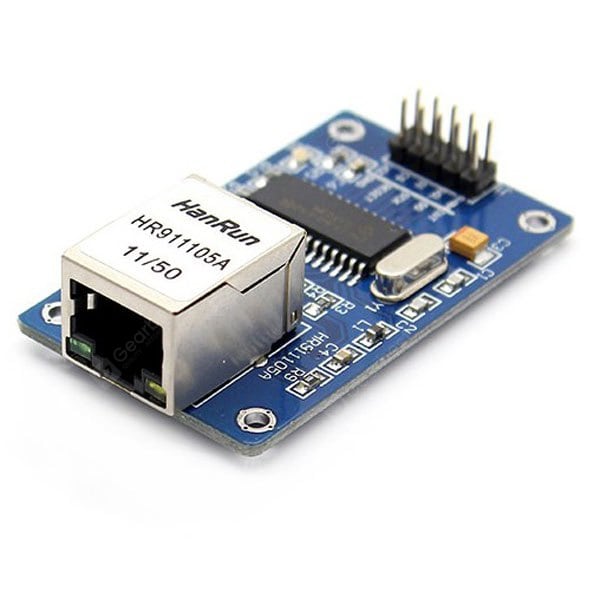Mbed library for ENC28J60 Ethernet modules. Full support for TCP/IP and UDP Server, Client and HTTP server (webserver). DHCP and DNS is included.
Dependents: mBuino_ENC28_MQTT Nucleo_Web_ENC28J60 Nucleo_Web_ENC28J60_ADC Serial_over_Ethernet ... more
Library for ENC28J60 Ethernet modules.

Ported to mbed from Norbert Truchsess's UIPEthernet library for Arduino. Thank you Norbert!
- Full support for persistent (streaming) TCP/IP and UDP connections Client and Server each, ARP, ICMP, DHCP and DNS.
- Works with both Mbed OS 2 and Mbed OS 5.
Usage:
- Import the library into your project.
- Add
#include "UipEthernet.h"tomain.cpp - Create one instance of the UipEthernet class initialized with the MAC address you'd like to use and SPI pins of the connected Mbed board.
Example programs:
Import programWebSwitch_ENC28J60
HTTP Server serving a simple webpage which enables to remotely turn a digital output on/off. Compile, download, run and type 'IP_address/secret/' (don't forget the last '/') into your web browser and hit ENTER.
Import programHTTPServer_Echo_ENC28J60
A simple HTTP server echoing received requests. Ethernet connection is over an ENC28J60 board. Usage: Type the server's IP address into you web browser and hit <ENTER>.
Import programTcpServer_ENC28J60
Simple TCP/IP Server using the UIPEthernet library for ENC28J60 Ethernet boards.
Import programTcpClient_ENC28J60
Simple TCP/IP Client using the UIPEthernet library for ENC28J60 Ethernet boards.
Import programUdpServer_ENC28J60
Simple UDP Server using the UIPEthernet library for ENC28J60 Ethernet boards.
Import programUdpClient_ENC28J60
Simple UDP Client using the UIPEthernet library for ENC28J60 Ethernet boards.
Import programMQTT_Hello_ENC28J60
MQTT Client example program. Ethernet connection is via an ENC28J60 module.
Diff: DhcpClient.cpp
- Revision:
- 15:53715cc81c63
- Parent:
- 9:a156d3de5647
- Child:
- 17:1123c3fe86ca
--- a/DhcpClient.cpp Tue Sep 03 09:16:55 2019 +0000
+++ b/DhcpClient.cpp Sat Sep 07 17:42:42 2019 +0000
@@ -2,6 +2,7 @@
// Author: Jordan Terrell - blog.jordanterrell.com
#include <string.h>
#include <stdlib.h>
+#include "UipEthernet.h"
#include "DhcpClient.h"
#include "utility/util.h"
@@ -44,54 +45,78 @@
//return:0 on error, 1 if request is sent and response is received
int DhcpClient::requestDhcpLease()
{
+#ifdef UIPETHERNET_DEBUG_UDP
+ printf("requestDhcpLease(): begin\r\n");
+#endif
uint8_t messageType = 0;
+ Timer timer;
+
+ timer.reset();
+ timer.start();
// Pick an initial transaction ID
- srand(time(NULL));
+ srand(time(NULL)+ 1);
_dhcpTransactionId = (rand() % 2000UL) + 1;
_dhcpInitialTransactionId = _dhcpTransactionId;
_dhcpUdpSocket.stop();
if (_dhcpUdpSocket.begin(DHCP_CLIENT_PORT) == 0) {
// Couldn't get a socket
+#ifdef UIPETHERNET_DEBUG_UDP
+ printf("requestDhcpLease(): Couldn't get a socket\r\n");
+#endif
return 0;
}
presendDhcp();
volatile int result = 0;
- time_t startTime = time(NULL);
while (_dhcp_state != STATE_DHCP_LEASED) {
if (_dhcp_state == STATE_DHCP_START) {
+#ifdef UIPETHERNET_DEBUG_UDP
+ printf("_dhcp_state: STATE_DHCP_START\r\n");
+#endif
_dhcpTransactionId++;
- sendDhcpMessage(DHCP_DISCOVER, (time(NULL) - startTime));
+ sendDhcpMessage(DHCP_DISCOVER, (timer.read_ms() / 1000 + 1));
_dhcp_state = STATE_DHCP_DISCOVER;
}
else
if (_dhcp_state == STATE_DHCP_REREQUEST) {
+#ifdef UIPETHERNET_DEBUG_UDP
+ printf("_dhcp_state: STATE_DHCP_REREQUEST\r\n");
+#endif
_dhcpTransactionId++;
- sendDhcpMessage(DHCP_REQUEST, (time(NULL) - startTime));
+ sendDhcpMessage(DHCP_REQUEST, (timer.read_ms() / 1000 + 1));
_dhcp_state = STATE_DHCP_REQUEST;
}
else
if (_dhcp_state == STATE_DHCP_DISCOVER) {
+#ifdef UIPETHERNET_DEBUG_UDP
+ printf("_dhcp_state: STATE_DHCP_DISCOVER\r\n");
+#endif
uint32_t respId;
messageType = parseDhcpResponse(_responseTimeout, respId);
if (messageType == DHCP_OFFER) {
// We'll use the transaction ID that the offer came with,
// rather than the one we were up to
_dhcpTransactionId = respId;
- sendDhcpMessage(DHCP_REQUEST, (time(NULL) - startTime));
+ sendDhcpMessage(DHCP_REQUEST, (timer.read_ms() / 1000 + 1));
_dhcp_state = STATE_DHCP_REQUEST;
}
}
else
if (_dhcp_state == STATE_DHCP_REQUEST) {
+#ifdef UIPETHERNET_DEBUG_UDP
+ printf("_dhcp_state: STATE_DHCP_REQUEST\r\n");
+#endif
uint32_t respId;
messageType = parseDhcpResponse(_responseTimeout, respId);
if (messageType == DHCP_ACK) {
+#ifdef UIPETHERNET_DEBUG_UDP
+ printf("messageType: DHCP_ACK\r\n");
+#endif
_dhcp_state = STATE_DHCP_LEASED;
result = 1;
@@ -115,23 +140,37 @@
_rebindInSec = _dhcpT2;
}
else
- if (messageType == DHCP_NAK)
+ if (messageType == DHCP_NAK) {
+ #ifdef UIPETHERNET_DEBUG_UDP
+ printf("messageType: DHCP_NAK\r\n");
+#endif
_dhcp_state = STATE_DHCP_START;
+ }
}
if (messageType == 255) {
+#ifdef UIPETHERNET_DEBUG_UDP
+ printf("DHCP_NAK: 255\r\n");
+#endif
messageType = 0;
_dhcp_state = STATE_DHCP_START;
}
- if ((result != 1) && ((time(NULL) - startTime) > _timeout))
+ if ((result != 1) && ((timer.read_ms() / 1000) > _timeout)) {
+#ifdef UIPETHERNET_DEBUG_UDP
+ printf("requestDhcpLease(): timeout\r\n");
+#endif
break;
+ }
}
// We're done with the socket now
_dhcpUdpSocket.stop();
_dhcpTransactionId++;
+#ifdef UIPETHERNET_DEBUG_UDP
+ printf("requestDhcpLease(): %d\r\n", result);
+#endif
return result;
}
@@ -182,17 +221,17 @@
// yiaddr: already zeroed
// siaddr: already zeroed
// giaddr: already zeroed
- //put data in W5100 transmit buffer
+ //put data in ENC28J60 transmit buffer
_dhcpUdpSocket.write(buffer, 28);
memset(buffer, 0, 32); // clear local buffer
memcpy(buffer, _dhcpMacAddr, 6); // chaddr
- //put data in W5100 transmit buffer
+ //put data in ENC28J60 transmit buffer
_dhcpUdpSocket.write(buffer, 16);
memset(buffer, 0, 32); // clear local buffer
// leave zeroed out for sname && file
- // put in W5100 transmit buffer x 6 (192 bytes)
+ // put in ENC28J60 transmit buffer x 6 (192 bytes)
for (int i = 0; i < 6; i++) {
_dhcpUdpSocket.write(buffer, 32);
}
@@ -222,7 +261,7 @@
printByte((char*) &(buffer[26]), _dhcpMacAddr[4]);
printByte((char*) &(buffer[28]), _dhcpMacAddr[5]);
- //put data in W5100 transmit buffer
+ //put data in ENC28J60 transmit buffer
_dhcpUdpSocket.write(buffer, 30);
if (messageType == DHCP_REQUEST) {
@@ -242,7 +281,7 @@
buffer[10] = _dhcpDhcpServerIp[2];
buffer[11] = _dhcpDhcpServerIp[3];
- //put data in W5100 transmit buffer
+ //put data in ENC28J60 transmit buffer
_dhcpUdpSocket.write(buffer, 12);
}
@@ -256,7 +295,7 @@
buffer[7] = dhcpT2value;
buffer[8] = endOption;
- //put data in W5100 transmit buffer
+ //put data in ENC28J60 transmit buffer
_dhcpUdpSocket.write(buffer, 9);
_dhcpUdpSocket.endPacket();
@@ -272,11 +311,12 @@
{
volatile uint8_t type = 0;
uint8_t opt_len = 0;
+ Timer timer;
- unsigned long startTime = time(NULL);
+ timer.start();
while (_dhcpUdpSocket.parsePacket() <= 0) {
- if ((time(NULL) - startTime) > responseTimeout) {
+ if (timer.read() > responseTimeout) {
return 255;
}
